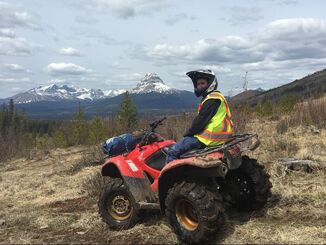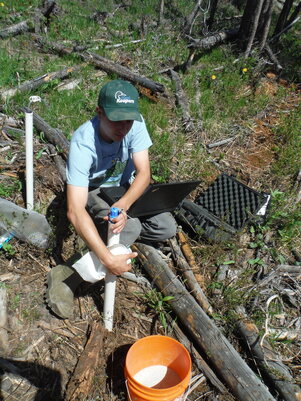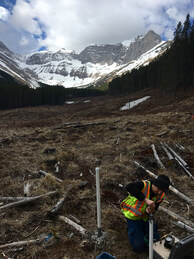 Land disturbances, like clear-cut harvesting, can influence the concentrations of dissolved organic carbon (DOC) in stream water, which can have implications for downstream drinking water quality and treatment. Derek Mueller, a Masters student from the University of Alberta, investigated how these disturbances influence DOC dynamics during their journey from the land to the receiving stream in the Montane Cordillera ecozone. The Montane Cordillera is located in western Canada and has a landscape comprised of steeply rolling hillslopes as well as rugged mountains. This research is important because understanding how much DOC is transported from hillslopes to streams and how its chemical make-up changes during transport provides insight to how forest management impacts source water quality. Contemporary clear-cut harvesting as a forest management strategy did not negatively impact DOC in receiving streams. This finding can inform management decisions in hydrologically similar catchments. “For this aspect of my research, I looked to understand how DOC-mineral soil adsorption was impacted by hillslope position, soil horizon, and disturbance," said Mueller. "Adsorption can immobilize carbon and prevent some or all of it entering water supplies.” What Mueller found was the opposite of what he expected. Soils in the Montane Cordillera ecozone did not readily adsorb carbon but could potentially be a source of carbon. Further he concluded that forest harvesting can be considered as part of broader source water protection strategies in this region when best management practices are implemented. Mueller stated, “Soil water showed elevated DOC concentrations in the harvested catchment over that of the undisturbed reference catchment. However, this difference was not reflected in streams." This work underscores the importance of understanding relationship between hillslope processes and the quality of receiving streams. “My hope is that this research can contribute to land management decisions made by forest managers,” said Mueller. “Ideally my work in conjunction to other forWater Network studies will contribute to a broader comparative study of forest management impacts on water quality across the different ecozones in Canada.” Mueller’s research is a result of previous collaborations between his supervisors Dr. Uldis Silins, Dr. Miles Dyck and Alberta Agriculture and Forestry, Alberta Environment and Parks, Canfor and NSERC, among other important partners. Mueller hopes this research allows the partners and stakeholders to better understand how landscape management impacts source water protection in this region. Derek has completed his Masters and is now hired as a Project Assistant for the Adaptation Resilience Training program. He is jointly hosted by the University of Alberta Sustainability Council and EPCOR Drainage. Derek's thesis will be available on November 15th at https://era.library.ualberta.ca/. Derek Mueller's 3 minute thesis competition submission summarizes key points from his research and subsequently earned him 1st place prize at the Annual General Meeting of the forWater Network in April 2020.
1 Comment
|
forWater NetworkThe Network provides insights into new scientific research for safe, secure drinking water---globally---which starts with resilient forests Archives
October 2023
Categories |




 RSS Feed
RSS Feed

